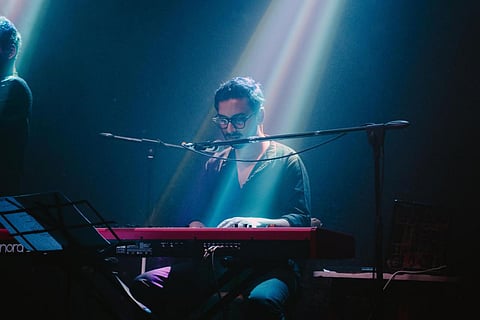
- LIFESTYLE
- FASHION
- FOOD
- ENTERTAINMENT
- EVENTS
- CULTURE
- VIDEOS
- WEB STORIES
- GALLERIES
- GADGETS
- CAR & BIKE
- SOCIETY
- TRAVEL
- NORTH EAST
- INDULGE CONNECT

Tushar Lall, who scored music for director Shauna Gautam’s recently released Nadaaniyan, starring Ibrahim Ali Khan and Khushi Kapoor, is delighted that his first romantic album has been well-received by the audience. The composer has in his repertoire films and documentaries like Brahmastra, Dancing on the Grave, and Curry and Cyanide, and he says that Nadaaniyan was an inspiring experience.
“It was really exciting to work on the film’s score, and I loved the opportunity it gave me to tell the story through music. In a way, I had more freedom than usual. The climax of the film, for example, is entirely driven by the score, with no dialogues. That gave me a chance to prioritise the music, letting it play a central role in the narrative. This was something I hadn’t experienced in a documentary feature, where the narrative tends to be more driven by dialogue and visuals.”
He adds, “When I approached the score for this film, I had to combine two very distinct elements: the surface-level, synth-heavy sound that resonates with Gen Z and the grand, classical style expected in a Dharma film. Finding the balance between these two was tricky, but ultimately, it came together in a way that felt right. There are moments in the score where it starts with a light, rom-com vibe but then builds into something much more dramatic with orchestral backing. It felt like a new territory to explore, and I enjoyed every moment of it.”
The composer says that it was a challenge blending Gen Z influences with an orchestral score. “At 29, I feel there’s a gap between me and the younger generation. They’ve grown up in a world of constant information and social media, and their way of thinking, communicating, and creating is so different from how we grew up. The way they relate to the world is shaped by their exposure to devices from a young age, which is a stark contrast to how we grew up.”
For Tushar, one of the standout moments in the film was the remix of the Ms. Briganza theme, which last appeared in Kuch Kuch Hota Hai (1998) and makes a comeback in Nadaaniyan. “When I saw her character make her entrance, I couldn’t help but think of Kuch Kuch Hota Hai—a film we all grew up with. I mean, she is such an iconic character. The fact that I had access to the stems from the original track and could remix them for the film was a huge opportunity. It felt like playing with a piece of cinematic history, and I loved diving into that.”
The composer tells us that he tends to choose projects that challenge him. “My career as a film composer started during the pandemic when live events came to a halt. Since then, I’ve worked on a variety of genres, including documentaries, comedies, and rom-coms. I’m still figuring out where my strengths lie, but I think the more I experiment with different styles, the clearer that will become. Right now, I’m loving the chance to compose for genres where the music can play a much larger role in the storytelling.”
When asked what exactly Tushar looks for in a project before taking it up, he says, "The most important factor is that it should challenge me. For example, scoring for a romance film requires a whole different approach compared to a documentary or a comedy. I thrive in environments that push me to grow, and I'm excited to see where this journey takes me."
And whom does he look up to when it comes to musicians? "I’ve been fortunate to look up to some incredible composers. Globally, Hans Zimmer, John Williams, and Ludwig Göransson are major influences. In India, Tanuj Tiku is someone I deeply admire for his incredible work, like the score for Laal Singh Chaddha. It’s interesting to note that in India, the distinction between song composers and film composers isn’t always made. Composers of scores often don’t get the same spotlight as those who create songs, even though their work is just as intensive and impactful."
On a parting note, he talks about his plans for his band, The Indian Jam Project, and he says, "As for Indian Jam, we’ve been touring extensively, with over 50 shows this season alone, both in India and internationally. The focus has always been on creating something unique, like our upcoming project, an Indian take on Oppenheimer. Live shows have seen a major resurgence since COVID. People have rediscovered the value of in-person experiences, and that’s made us more secure in the knowledge that live music is irreplaceable by AI. To wrap up, I feel lucky to be part of a field that still thrives on human creativity and connection. Whether through composing film scores or performing live, I get to share stories with people in a way that will never be replaced by technology."
sangeetha.p@newindianexpress.com
X-@psangeetha2112